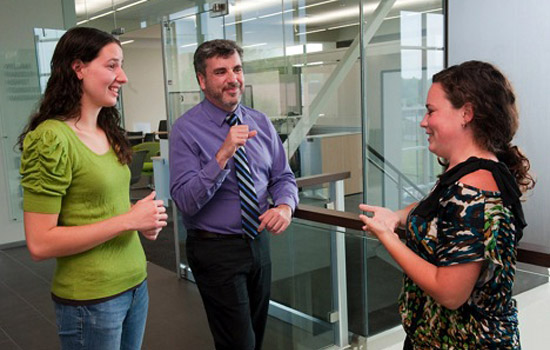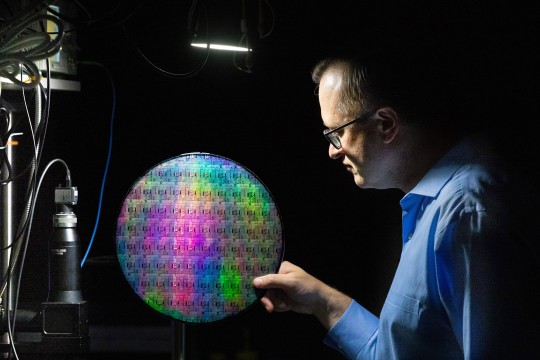Grant fuels ‘Rochester Bridges to the Doctorate’
Mark Benjamin
Peter Hauser, director of the Deaf Studies Laboratory at NTID, chats with graduate students Gloria Wink, left, of Rochester and Gina DeNaples of Greensboro, N.C.
The nation’s first educational program specifically tailored to deaf and hard-of-hearing people pursuing graduate degrees in biomedical or behavioral science begins Sept. 1 in Rochester, a community characterized by a well-educated and large deaf population and a unique collaborative atmosphere.
The National Institute for General Medical Sciences, part of the National Institutes of Health, awarded the $2.1 million grant to the University of Rochester Medical Center’s Clinical & Translational Science Institute (CTSI) and Rochester Institute of Technology’s National Technical Institute for the Deaf, Center on Access Technology. The objective is to build a model program that integrates activities at each university to improve the experience of deaf and hard-of-hearing students seeking advanced degrees. Called the “Rochester Bridges to the Doctorate,” the program will facilitate a transition from master’s degree programs offered at the various colleges at RIT to Ph.D. programs at UR.
“Deaf and hard-of-hearing students are woefully underrepresented among Ph.D. candidates in the sciences, and this landmark training program aims to bridge the gaps—in communication, mentoring and across languages and cultures—to address the critical shortage,” said Dr. Thomas A. Pearson, principal investigator for UR, senior associate dean for clinical research, director of UR’s National Center for Deaf Health Research (NCDHR), and CTSI director.
“Until now, deaf people interested in science faced a glass ceiling at the master’s degree level,” Pearson said. “We’ve already received scores of inquiries from interested students, and we believe we’re addressing a huge, unmet need.”
“This is an amazing opportunity for aspiring deaf scholars who have long been under-served and under-recognized,” said Peter C. Hauser, principal investigator for RIT, director of the Deaf Studies Laboratory at NTID and Science Mentorship Leader for the NSF Science of Learning Center on Visual Language and Visual Learning. “We applaud NIH for recognizing the deaf population as a minority group and awarding this grant to broaden the participation of deaf and hard-of-hearing individuals in biomedical and behavioral sciences.”
The five-year grant will offer many new opportunities. Mentoring faculty will hold special seminars and skill-building workshops on topics like grant-writing and responsible conduct of research and will provide tutoring, counseling, graduate assistantships and a summer-in-residence program. The program will also help prepare research faculty and their labs to work with deaf and hard-of-hearing students. Researchers will track graduate degree completion and other career-development outcomes among deaf and hard-of-hearing students in the program, compared to students not enrolled in the program.
Two graduate students will enroll in the first year, with three students per year in each of the following four years. The goal in the initial five years is to provide a total of 14 students with the knowledge and skills required for a successful career in the biomedical and behavioral sciences.
This latest project comes on the heels of other pioneering joint ventures that are the result of recommendations of the National Task Force on Health Care Careers for the Deaf and Hard-of-Hearing Community, a collaboration that also involves RIT/NTID and the University of Rochester. The task force identified a critical need for training more deaf and hard-of-hearing people for health-related careers, and RIT/NTID and the NCDHR have formed a strong partnership to address this need and pursue the goal of Rochester becoming a world training center. In addition, RIT and UR have joined forces to create a joint master’s degree in medical informatics, to fill a void in health care technology workers.
“This level of collaboration is a sign of two institutions that are interested in finding ways to solve problems by doing things differently than they’ve traditionally been done,” said Gerry Buckley, NTID president and RIT vice president and dean.
That cooperative spirit, coupled with steadfast partnership with the deaf community, has led to many successes already. Web videos, health directories, and health surveys have been produced in American Sign Language through the NCDHR, for example; and several studies geared toward deaf individuals are taking place, using a model called community-based participatory research, involving the deaf community in every aspect of the research from the design phase to communication of results.
In addition to Pearson and Hauser, the grant includes several key personnel: Dr. Steven L. Barnett, associate director of the NCDHR and associate professor of Family Medicine and Public Health Sciences at URMC; James J. DeCaro, professor in the Center on Access Technology at RIT/NTID; Richard Doolittle, vice dean of the College of Health Sciences and Technology at RIT; Hector Flores, dean of Graduate Studies at RIT; Dr. Vivian Lewis, vice provost for Faculty Development and Diversity at UR; Edith M. Lord, senior associate dean for Graduate Education at URMC; Camille A. Martina, research assistant professor of Public Health Sciences at URMC; Dr. Daniel Ornt, vice president and dean, Institute of Health Sciences and Technology at RIT; and P. J. Simpson-Haidaris, associate professor of Medicine and director of the Translational Biomedical Sciences Ph.D. program at the Clinical & Translational Science Institute at URMC.












